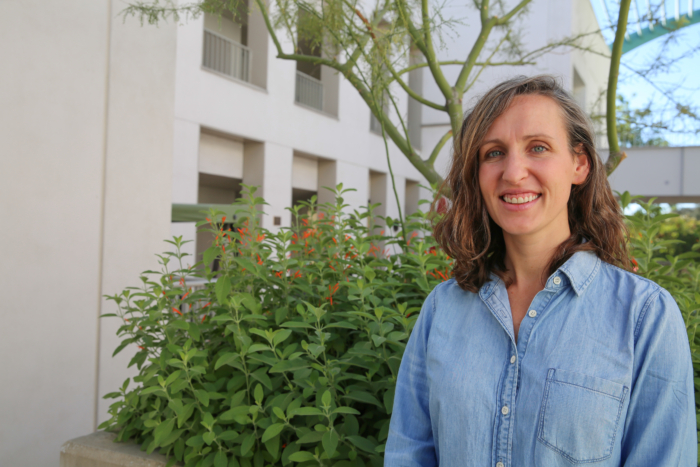
This fall, 11 new tenure-track faculty members joined Scripps College. As part of our ongoing series on Scripps’ faculty, the Office of Marketing and Communications recently sat down with Findley Finseth, who joins the College as Assistant Professor of Genomics in the W.M. Keck Science Department.
Finseth received her BSc in biology from the University of Virginia and her PhD in ecology and evolution from Cornell University. Her research program investigates the evolutionary drivers of biodiversity. By complementing modern genomics studies of natural populations with classic genetics experiments, Finseth’s work offers novel insight into the maintenance of genetic variation, the processes of adaptation and speciation, and the evolution of the genome itself. As a Presidential Life Sciences Fellow at Cornell University, Findley investigated how sexual selection shapes genes involved in reproduction in birds, and as a post-doctoral research associate at the University of Montana, she studied evolutionary genomics in yellow monkeyflowers.
Scripps College: How did you get interested in science as a direction for your career?
Findley Finseth: I always liked biology in school. In college, I was in a program that didn’t have Gen Ed requirements, and I floated naturally towards biology classes. At the University of Virginia, I undertook summer programs where I conducted my own sort of vocational experiment: I spent half of the summer in the Bahamas doing a coral reef ecology project, and the other half in an immersion class studying British authors. I decided to keep my love of reading as an avocation, but the science project underscored for me how much I enjoy the elegance of the scientific method, and that led to my ultimate pursuit of a career that would allow me to explore what processes shape biodiversity.
SC: Your work exploring the female meiotic drive of the flowering Mimulus provides a good example of genetic conflict. What does this project tell us about reproductive success?
FF: The female centromeres of Mimulus guttatus evolve “selfishly,” meaning elements found on some chromosomes can—through genetic mechanisms—ensure their own evolutionary success at the expense of the individual’s fitness. Female meiosis, in particular, presents unique opportunities for competition between chromosomal features called “centromeres” for evolutionary dominance. In Mimulus, we have identified a centromere that is very good at manipulating female meiosis in a way that guarantees it (and not other versions of the centromere) gets passed on to offspring. However, this “driving centromere” makes individuals reproductively unfit; females produce less seeds, and males produce bad pollen if they carry two copies of this centromere. Additionally, the centromere has influenced how the organism’s chromosomes have been shaped over evolutionary time and how genetically diverse the chromosomes that carry it are. Understanding such drive dynamics are important for disentangling the genetic basis of variation in reproductive success—an important issue in agriculture and human health—and Mimulus provides an excellent model system to study this process.
SC: From a professor who readily admits she’s impassioned about “in the weeds” genetics, no pun intended, what do you hope students will experience in your classes?
FF: Well, in fairness, my work hasn’t always been all about plants! I’ve also investigated how sexual selection shapes genes involved in reproduction in birds. But, for lab purposes, plants and their parts are really easy to work with, to obtain, to store. I’m excited that our greenhouse is ready, and students will easily be able to work with samples that inform our research. My classes tend to be inquiry-based; we solve problems through experimental design. I want them to be able to take a body of data, apply analytical skills to interpret it, and draw conclusions. As such, we really focus on experiments. And, I want them to learn to approach any problem in life from an inquiry-based approach.
SC: Is there a fact about yourself that is surprising, or that people don’t know about, that you’d like to share?
FF: I recently moved from Montana, where I took up gardening. I am beginning a garden here, but am finding that I have a lot to learn about the year-round growing season—new plants, planting times, etc. It’s fun, and I’m excited to learn more!

